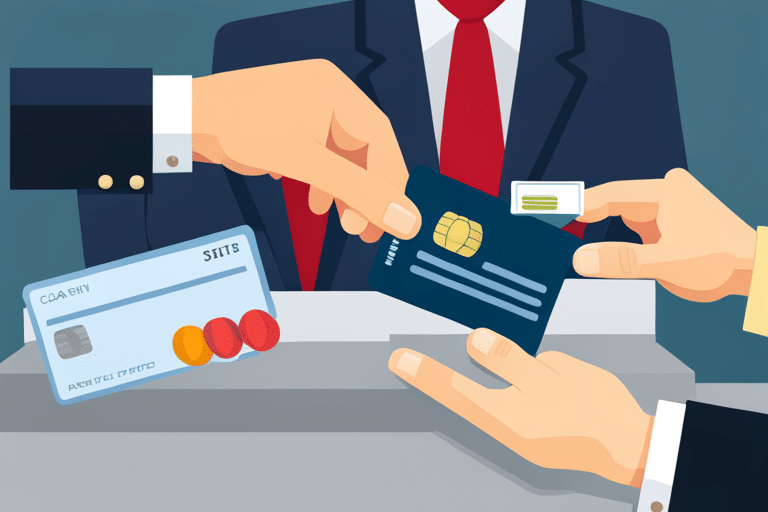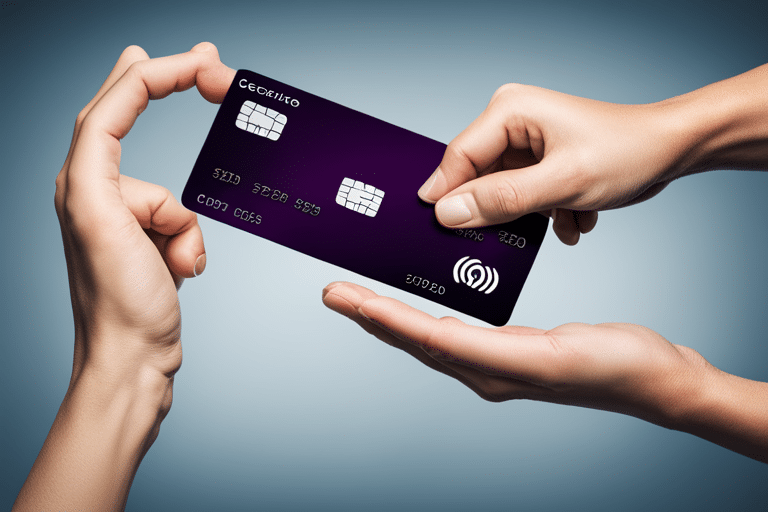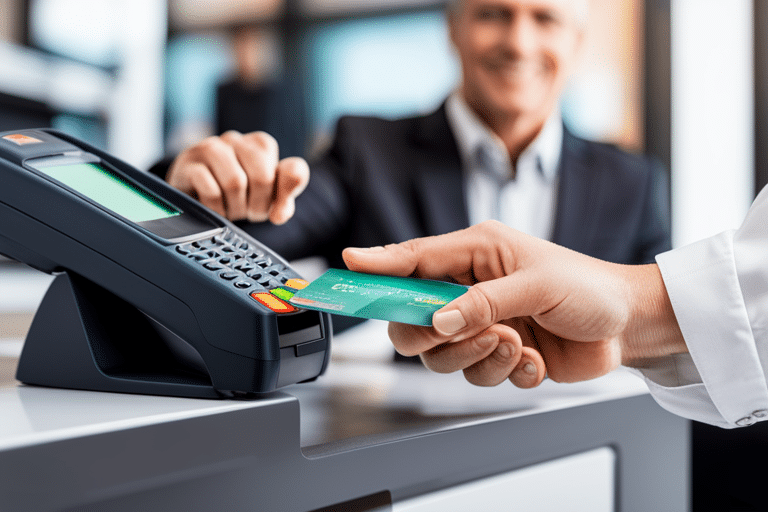Are you ready to take control of your credit score?
With secured credit cards, you can build a solid foundation for your financial future. These powerful tools not only help you establish credit but also provide the opportunity to improve it.
In this article, we’ll explore the ins and outs of secured credit cards, from how they work to the benefits they offer.
Get ready to embark on a journey towards financial mastery with the role of secured credit cards in building credit.
Key Takeaways
- Secured credit cards require a cash deposit as collateral and are designed for individuals with limited or damaged credit history.
- Secured credit cards help establish or improve credit scores by demonstrating responsible financial behavior.
- They have lower fees compared to unsecured cards and can be a great tool for building or rebuilding credit.
- Timely payments and responsible credit management with secured credit cards can improve credit score and increase chances of loan approval.
Understanding Secured Credit Cards

To understand how secured credit cards work, you need to know that they require a cash deposit as collateral. But don’t let that scare you off! Secured cards can actually be a great tool for building or rebuilding your credit.
Let’s dive into the benefits and eligibility requirements of secured credit cards.
One of the major benefits of having a secured credit card is that it allows you to establish or rebuild your credit history. By using the card responsibly and making timely payments, you can demonstrate to lenders that you are a responsible borrower. This can open up doors for future loans and credit opportunities.
Another benefit of secured cards is that they often come with lower fees compared to unsecured cards for people with limited or poor credit. This means you won’t have to worry about high annual fees eating away at your available credit limit.
Now, let’s talk about eligibility. Secured credit cards are specifically designed for individuals who may not meet the requirements for traditional unsecured cards due to their limited or damaged credit history. Since these cards require a cash deposit as collateral, issuers are more willing to extend them even to those with less-than-perfect financial backgrounds.
So if you’re someone who wants to start building your credit from scratch or repair it after some setbacks, a secured card could be just what you need. Not only will it give you the opportunity to prove yourself as a responsible borrower but also provide access to essential financial tools and resources along the way.
How Secured Credit Cards Work

Secured credit cards work by requiring a cash deposit as collateral. Basically, you put down a certain amount of money, and that becomes your credit limit. It’s like having a safety net for your spending. But the benefits don’t stop there!
Secured credit cards can actually help you build or rebuild your credit history. One of the major benefits of using a secured credit card is that it allows you to establish or improve your credit score. By making regular payments on time and keeping your balance low, you demonstrate responsible financial behavior to lenders. This can open doors for future opportunities such as getting approved for loans with better terms or even renting an apartment.
Now, when it comes to requirements, secured credit cards are typically easier to obtain than traditional unsecured cards. They are designed specifically for people who have limited or poor credit history. So even if you’ve had some financial setbacks in the past, securing a card shouldn’t be too much of a challenge.
To get started, all you need is a cash deposit – usually ranging from $200 to $500 – and proof of income to show that you’re able to make monthly payments. Some issuers may also require a minimum age (usually 18) and valid identification.
Benefits of Using a Secured Credit Card

Using a secured credit card can help you establish or improve your financial reputation. It may sound like just another piece of plastic, but trust me, it’s so much more than that. With a secured credit card, you have the power to boost your creditworthiness and build a solid credit history.
Now, let me break it down for you in simple terms. A secured credit card is backed by a cash deposit that you make when opening the account. This deposit acts as collateral and gives the lender confidence in extending you the line of credit. But don’t worry, this doesn’t mean your money is locked away forever! As long as you use the card responsibly and make timely payments, that cash deposit will be returned to you eventually.
So why should you bother with all this? Well, my friend, using a secured credit card is like taking baby steps towards financial success. It shows lenders that you are responsible with borrowing money and making payments on time. And as your payment history improves over time, so does your creditworthiness.
Establishing a good credit history is essential for many things in life – getting approved for loans or mortgages, renting an apartment, even landing certain jobs! So think of using a secured credit card as an investment in yourself and your future.
Factors to Consider When Choosing a Secured Credit Card

When choosing a secured credit card, it’s important to consider factors such as interest rates, fees, and credit limit. These key factors will determine how well the card fits your needs and whether it can help you build or rebuild your credit effectively. Let’s break down these factors in more detail:
| Factors to Consider | Pros | Cons |
|---|---|---|
| Interest Rates | – Lower interest rates can save you money in the long run – Easier to pay off balances without accruing high interest charges |
– Some secured cards have higher interest rates compared to traditional credit cards – Late payments can result in increased interest rates |
| Fees | – Many secured cards have low or no annual fees – Some cards offer fee waivers for good payment behavior |
– Some secured cards may have application or processing fees – Foreign transaction fees may apply if you travel internationally |
| Credit Limit | – A higher credit limit allows for greater purchasing power – Can potentially increase your credit score faster |
– Secured cards typically require an initial deposit that determines the credit limit – Higher limits could lead to overspending if not managed responsibly |
Considering these factors will help you find a secured credit card that suits your financial goals and circumstances. It’s important to weigh the pros and cons of each factor before making a decision. Remember, building good credit takes time and responsible financial habits. By using a secured credit card wisely, you can establish positive payment history and improve your overall creditworthiness.
Now that we’ve covered the essential factors to consider when choosing a secured credit card, let’s explore some additional tips on how to make the most out of this powerful tool for building or rebuilding your credit.
Building Credit With a Secured Credit Card

So you’ve decided to build your credit with a secured credit card? Great choice!
Before diving in, let’s talk about the requirements you’ll need to meet and how it can impact your credit score.
Don’t worry, we’ll break it down for you in an easy-to-understand way so you can make the best decision for your financial future.
Secured Card Requirements
To qualify for a secured credit card, you’ll need to meet specific requirements set by the issuer. But don’t worry, it’s not as daunting as it sounds! Secured cards are designed to help people with limited or poor credit history build their creditworthiness. Here’s a handy table that breaks down the typical eligibility criteria and application process:
| Eligibility Requirements | Application Process |
|---|---|
| Be at least 18 years old | Fill out an online or paper application |
| Have a valid social security number or taxpayer identification number | Provide required personal information and documentation |
| Provide a refundable security deposit (typically $200-$500) | Wait for approval decision from the issuer |
| Show proof of income or ability to repay debts | Receive your new secured credit card in the mail |
Credit Score Impact
Your credit score can be greatly influenced by the way you use your secured card. It’s not just about making timely payments, but also about managing your credit responsibly. By using your secured card wisely and maintaining a low balance, you can improve your credit score over time.
Remember, lenders want to see that you are capable of handling credit responsibly, and a secured card is a great tool to demonstrate that. Your payment history and utilization ratio play a significant role in determining your creditworthiness. So make sure to pay off your balances on time and keep them low to show lenders that you are reliable and trustworthy.
With consistent effort, you can see a positive impact on your credit score and ultimately increase your chances of getting approved for loans or better interest rates in the future.
Tips for Responsible Use of Secured Credit Cards

If you want to use a secured credit card responsibly, make sure to pay your bill on time and in full each month. Responsible spending is key when it comes to building credit and managing your credit limit. It’s like riding a wave – you want to stay balanced and in control.
To start off, keep track of your expenses and set a budget. This will help you avoid overspending and ensure that you can pay off your balance every month. Take advantage of online tools or apps that can help you monitor your spending and track your progress.
When it comes to using your secured credit card, remember that it’s not free money. Treat it as if it were cash coming out of your pocket. Only charge what you can afford to pay back promptly. This way, you won’t end up with a mountain of debt and high interest charges.
Another tip for responsible usage is keeping an eye on your credit limit. Your goal should be to use no more than 30% of the available credit at any given time. By doing so, you show lenders that you are responsible with managing the credit they have extended to you.
Now that you’ve mastered the art of responsible spending and credit limit management, it’s time to think about graduating from a secured to an unsecured credit card. With consistent responsible use over time, some financial institutions may offer the opportunity for an upgrade. This means higher limits, lower fees, and increased rewards – all signs that indicate positive growth in building your credit history.
Graduating From a Secured to an Unsecured Credit Card

Once you’ve demonstrated responsible usage, financial institutions may offer an upgrade from a secured to an unsecured credit card. This is the next step in your credit-building journey and an exciting milestone on your path towards financial independence.
Here’s what you need to know about the graduating process and getting approved for an unsecured credit card:
-
Improved Credit Score: Graduating from a secured to an unsecured credit card usually requires a significant improvement in your credit score. Your diligent efforts in using your secured card responsibly, paying off balances on time, and keeping low utilization rates will help boost your creditworthiness.
-
Trustworthy Payment History: Financial institutions want to see a track record of consistent, timely payments before granting you an unsecured credit card. Make sure you have paid off any outstanding balances and maintained a positive payment history for at least several months.
-
Increased Credit Limit: An upgraded unsecured credit card often comes with a higher credit limit than your initial secured card. This can provide more flexibility in managing your finances and allow you to make larger purchases when necessary.
-
Enhanced Benefits: Unsecured cards typically offer additional perks such as rewards programs, travel benefits, or cashback opportunities. As you graduate from a secured to an unsecured card, take advantage of these new features and enjoy the added benefits they bring.
Common Misconceptions About Secured Credit Cards

So you’ve been working hard to build your credit, and now it’s time to dive into the world of credit cards.
But before you jump in, let’s talk about two key points: the impact on your credit score and the difference between secured and unsecured cards.
Understanding these factors will help you make informed decisions as you navigate the world of credit.
Credit Score Impact
To see a positive impact on your credit score, make sure you consistently pay off your secured credit card balance in full and on time. This is essential for credit score improvement and has a significant impact on your credit history.
Here are some key factors to consider:
-
Payment History: Consistently paying off your secured credit card balance demonstrates responsible financial behavior and shows lenders that you are trustworthy.
-
Credit Utilization Ratio: Keeping a low balance relative to your credit limit shows that you can manage your available credit responsibly.
-
Length of Credit History: The longer you maintain a positive payment history with your secured credit card, the more it will positively impact your overall credit history.
-
Diversification of Credit Types: Having a mix of different types of accounts, including a secured credit card, can help boost your overall credit score.
By following these guidelines, you can ensure that you are making the most out of your secured credit card to improve your credit score.
Now let’s dive into the differences between secured and unsecured cards…
Secured Vs Unsecured Cards
Alright, now that you understand how your credit score can be impacted by using credit cards, let’s dive into the world of secured credit cards and explore their advantages over prepaid cards.
But first, let me draw you in with a nifty table that will help you visualize the differences between secured and prepaid cards:
| Secured Credit Cards | Prepaid Cards |
|---|---|
| Requires a security deposit as collateral | No need for a security deposit |
| Builds credit history when used responsibly | Does not impact credit history |
| Can have higher credit limits over time | Limits are based on the amount loaded |
Now, let’s talk about the advantages of secured credit cards. One major advantage is that they allow you to build or rebuild your credit history. By making timely payments and keeping your balances low, you demonstrate responsible borrowing behavior to future lenders. Additionally, some secured cards offer perks like cash back rewards or travel benefits.
In contrast, prepaid cards don’t require a security deposit but they also don’t help improve your credit score since they aren’t reported to credit bureaus. They are more like a convenient way to manage spending.
Frequently Asked Questions
Can I Use a Secured Credit Card to Make Purchases Outside of the United States?
Yes, you can use a secured credit card to make purchases outside of the United States. It’s a great way to build credit while enjoying the convenience and security of using plastic abroad.
Are There Any Annual Fees Associated With Secured Credit Cards?
Yes, there may be annual fees associated with secured credit cards. However, the benefits of using one for credit building outweigh the costs. It’s a small price to pay for improving your financial future.
How Long Does It Typically Take to Build Credit With a Secured Credit Card?
Building credit with a secured credit card typically takes time. It’s not an overnight process, but it can be a valuable tool in building your credit history. The benefits of using a secured credit card include establishing positive payment history and improving your credit score.
Can I Use a Secured Credit Card to Withdraw Cash From an Atm?
Sure, you can use a secured credit card to withdraw cash from an ATM. But remember, it’s better to use it for online transactions and building credit. That’s where the real benefits lie!
Is It Possible to Upgrade to an Unsecured Credit Card Without Closing My Secured Credit Card Account?
Sure! You can totally upgrade to an unsecured credit card without closing your secured one. It’s a smooth process that keeps your credit history intact and offers the benefits of keeping your secured card.
Conclusion
Congratulations on completing the article!
Now that you understand the role of secured credit cards, it’s time to put your newfound knowledge into action. Remember, building credit is a journey, and a secured credit card can be your trusty companion along the way.
Just imagine Sarah, a college student who started with no credit history. By responsibly using her secured credit card for small purchases and paying off her balance in full each month, she was able to establish a solid credit foundation. This allowed her to confidently apply for an unsecured credit card and even secure a car loan at competitive rates.
So go ahead, take that first step towards financial freedom with a secured credit card in hand!

